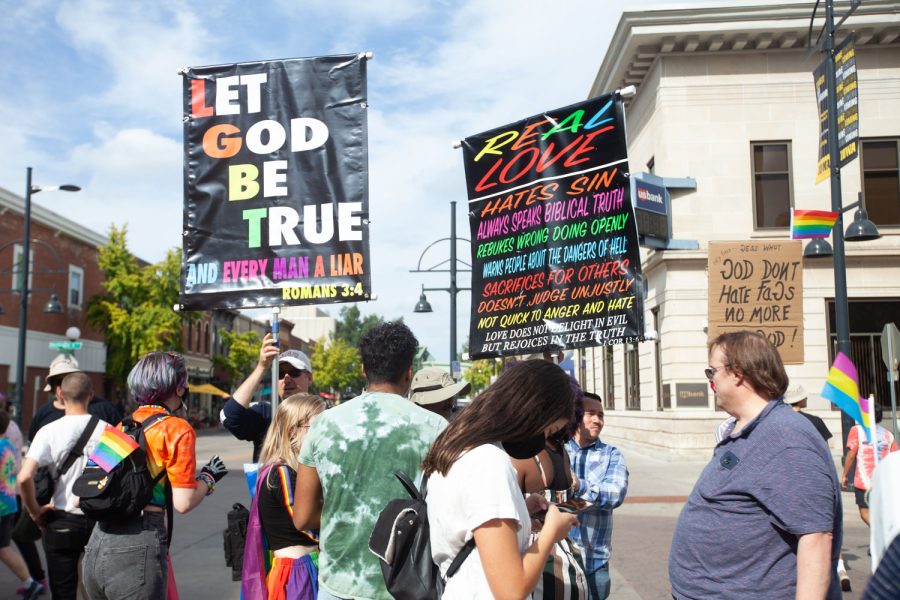LGBTQ+ students at the UI face hate from street preachers
LGBTQ+ students at the University of Iowa have taken it upon themselves to warn members of their community of anti-LGBTQ+ street preachers who come to campus.
Anti-gay protestors engage in conversations with the LGBTQ community at the intersection of Washington and Dubuque Streets on Saturday, Oct. 2, 2021.
October 5, 2021
The University of Iowa campus is no stranger to street preachers who spread anti-LGBTQ+ sentiments, often coming to campus without any advance announcement.
Because of this, members of UI LGBTQ+ groups, such as student organization Queer Liberation Front (formerly known as UI Spectrum) and sorority Gamma Rho Lambda, have taken to warning their members on their own with group messages.
“QLF and other LGBTQ orgs, such as UITA, find out by simply happening upon the preachers and warning the online chats, and that’s how the information is spread in our groups,” Queer Liberation Front president Simon Reichel wrote in an email to The Daily Iowan.
On Sept. 20, infamous evangelical TikTok preacher Sister Cindy spoke on the Pentacrest about her anti-LGBTQ+ views, among other topics. Her inflammatory messages are some of many students hear from preachers like her in public spaces on campus.
RELATED: TikTok’s Sister Cindy draws jeering crowd in Iowa City with inflammatory message
Vijay Pisini, a street preacher who has frequented campus since 2016, often carries a sign with him that claims that people in the LGBTQ+ community will go to hell. He, along with two other street preachers, preached most recently on the T. Anne Cleary Walkway on Sept. 28.
“Whenever we see [students], interact with them, preach the word, encourage them… there’s something called tough love. This is a tough love,” Pisini said. “‘Oh, you’re saying that you’re preaching hate?’ No, because it is all there, it is in the Bible.”
Pisini and his two fellow preachers made similar hateful comments during Iowa City’s Pride festival on Oct. 2.
“I’m embarrassed,” Gabby Kilpatrick, a Christian UI student, said about Pisini and his cohorts on Sept. 20. “He is really embarrassing to me. I don’t appreciate seeing him out here, and spreading the word like this, because this isn’t the right way to spread the word at all.”
The UI is a public university that is governed by the state Board of Regents. The regents’ policy in regards to free speech allows anyone to spread any message protected by the First Amendment on public areas and walkways.
“In order to maintain an environment that fosters the free exchange of ideas, the universities must not restrict the expression of viewpoints in violation of the First Amendment to the United States Constitution,” the policy states. “It is not the responsibility of the universities to shield individual members of the campus community from viewpoints they may find unwelcome, disagreeable, or offensive.”
Because of this policy, the UI cannot restrict anti-LGBTQ+ street preachers from campus because to do so would impede on the preachers’ right to free speech. The UI is a public university with an open campus, and to ban anti-LGBTQ+ street preachers from its campus would incur a lawsuit, the policy states.
“Right now, I know that they’re just talking, and they’re just saying things,” Amanda Miller, a bisexual UI student, said. “But who knows what is going to make them snap to act, and like hurt someone?”
Miller said she believes that anti-LGBTQ+ street preachers may embolden UI students who already have prejudice against the LGBTQ+ community into harming someone from that community.
UI student Bryce Janns said they believe the university could qualify some of the preacher’s topics as hate speech.
“I firmly believe that if the university took any time to pay attention to what these people are saying when they gather at this institution, they would clearly see that it is by definition hate speech, very disgusting behavior, that should not be allowed to transpire,” Janns said.
Janss, a member of the LGBTQ+ community and a member of the Queer Liberation Front, said when Sister Cindy arrived on campus, they were quickly warned about her by other QLF members.
“I feel like there should be a warning similar to how the university handles Hawk Alerts, by email, text, and phone call,” Janss said. “There should be a way to let people know that these things are taking place and this is the area that they’re taking place. So if that’s not something you want to witness, you should avoid.”
According to the public safety department website, the university only sends out Hawk Alerts if there is an immediate threat to students’ health and safety.
“The Hawk Alert system is used to notify the campus community of an event that is currently occurring on or imminently threatening the UI campus,” according to UI’s Public Safety Department.
Miller, who is not a member of any LGBTQ+ student organization, said she was not told about the preachers’ presence on Sept. 20 until she walked past them on her way to class.
She said she thinks people should be given the choice beforehand on whether they want to expose themselves to anti-LGBTQ+ rhetoric.
“The reason [LGBTQ+ students] come to the University of Iowa is to have a safe area to exist and live as who they really are,” Janss said. “And I feel like that’s being imposed on, I feel threatened by these individuals when they’re on campus.”



